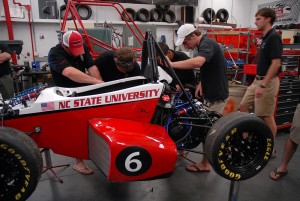 Mechanical engineering involves the practical application of mechanical and thermal sciences to research, design, develop, test, and manufacture a wide variety of products. The diverse areas to which mechanical engineers contribute include transportation, power generation, and energy conversion, environmental control and pollution abatement, noise control, and biomechanics. Recent developments have increased interest in such areas as robotics, mechatronics, precision engineering, automated manufacturing systems, combustion, and propulsion.
Mechanical engineering involves the practical application of mechanical and thermal sciences to research, design, develop, test, and manufacture a wide variety of products. The diverse areas to which mechanical engineers contribute include transportation, power generation, and energy conversion, environmental control and pollution abatement, noise control, and biomechanics. Recent developments have increased interest in such areas as robotics, mechatronics, precision engineering, automated manufacturing systems, combustion, and propulsion.
Mechanical engineering students are invited to participate in hands-on student projects such as Wolfpack Motorsports and Wolfpack Energy Efficient Locomotion (WEEL), amongst others.
Because of the wide range of applications and needs, mechanical engineering is one of the broadest engineering disciplines, and thus offers a variety of employment opportunities. Students are prepared to enter functional areas such as design, development, manufacturing, plant operation, testing, consulting, and sales in government, industry, and service settings. Mechanical engineering graduates are also well prepared to enter graduate school to pursue advanced degrees in engineering, science or business, as well as professional degree programs such as medicine, accounting, and law.
Please note: Students who are applying to Mechanical Engineering need to do so during the Spring CODA cycle; a very limited number of spaces are available in the Fall. Please contact Dr. Cheryl Tran in the department if you have questions about the CODA process for the department.
Courses include:
Thermodynamics, Fluid Mechanics, Dynamics of Machines, Heat Transfer, Strength of Mechanical Components, Mechanical Engineering Design, Principles of Automatic Control, Design of Thermal System, Senior Design Project.*
* Teams of students experience mechanical engineering design through problem definition, investigation, brainstorming, focus, critical review, design, analysis, prototype construction, and testing. Design for manufacture is encouraged throughout the process by having students build their own prototypes. Communication skills are developed through reports and presentations.
Additional Information:
In’s and Out’s of Engineering CODA
Video-Engineering Majors Exploration
Video-The Creativity of Engineering at NC State
14 Grand Challenges for Engineering
| College |
|
| Discipline |
|
| Academic Department | |
| Departmental Contact | |
| Major Overview | |
| Plan Requirements | |
| Semester Sequence | |
| Related Majors | |
| Minors |
|
| Skills You Could Develop |
|
| Learn More About This Major | |
| Career Titles |
|
| Learn More About Careers |